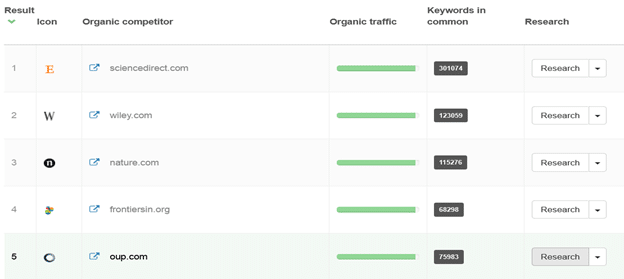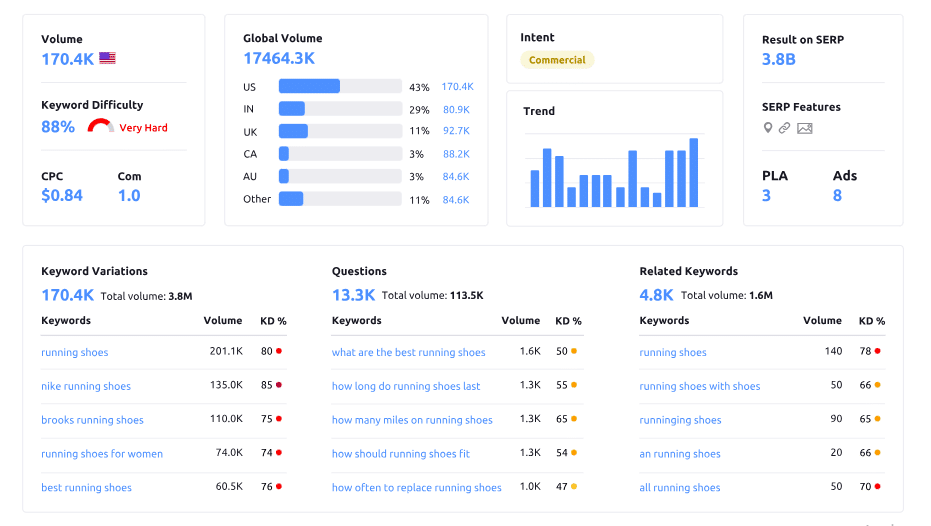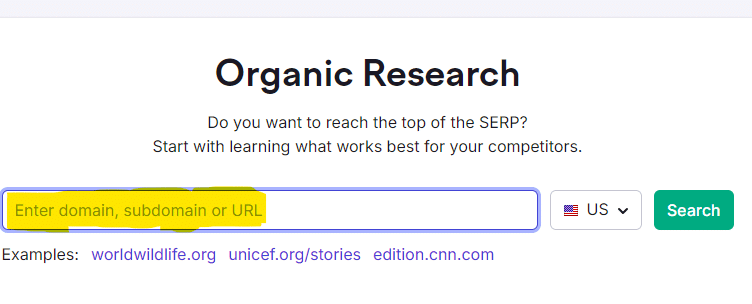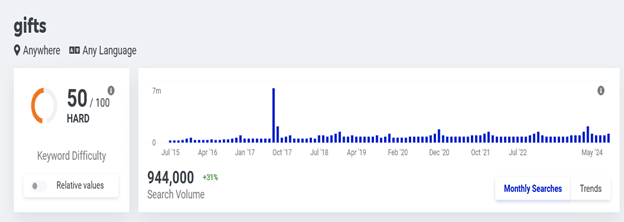What is keyword research in SEO?
Keyword research for SEO is a process of identification of words and phrases that the audience uses to enter search engines like Google, Yahoo, etc to search the products, online services, and online information. Identifying the keywords that are related to your business can optimize your marketing efforts content and the ranking of your website to attract more audience
Why is keyword research necessary?
Keyword research is important because you can make sure that there is a demand for your topic on search engines. So, by choosing a good keyword you can receive highly focused traffic on your page for high ranking in search engines. It also helps to understand the user’s potential and the intent behind their searches.
How to do keyword research for SEO?
The first step to doing keyword research is:
Find your niche
Keyword research for SEO starts with identifying your interest, and in which field you want to go, you should have the proper knowledge and focus on the keyword. This is called niche. After researching your niche, the first thing to do is to use some tools that will help us provide information about our keywords. For this, we take the help of some tools that tell us industry trends, target audiences, and about our competitors. These tools help us to get information about things like competitive analysis, search volume, and keyword difficulty.
The first step in keyword research is to identify a topic, idea, or head keyword—also known as a “seed keyword”. This seed may originate from your experience in the field, the goods and services you offer, your participation in relevant online forums and groups, or social listening.

Analyze the analytics for keywords
You will be able to determine immediately if anyone is looking for your seed term or phrase. Consider using a more general seed term to begin with if you’re not seeing any results.
Think about the intent associated with the keyword
Once you’ve searched for your brand or company’s listing for the keyword, see if the results match your hypothesis of what a normal person would be searching for.
Try your best to ascertain what information individuals are searching for when they use that keyword.
Check the ranking of your competitor
The greatest strategy to expedite your keyword research is usually to look at which terms already drive traffic to your competition. However, you must first locate their closest competitors.
Simply conduct a Google search using one of your seed keywords to see who appears on the home page. You can also check by using websites that tell you information about organic competitors as in the following picture.

Traffic potential
It can essentially be used to indicate how much organic traffic a website could produce if it ranked highly or at the top of the Google SERPs by using on-page SEO strategies.
Locate the most popular URL that you can compete. Although there is a semi-automated technique for doing this, you can also easily do it manually using Ahrefs’ Keyword Explorer tool.

Once you’ve determined which place you might rank for, copy and paste the URL that presently holds that position.
How to Make a List of SEO Keywords
For any SEO plan to be successful, a thorough list of SEO keywords must be created. Begin by generating a list of terms associated with your sector, goods, or services. Next, utilize tools for keyword research to make this list longer. Moz Keyword Explorer, Google Trends, SEMrush, Ahrefs, and Google Keyword Planner are a few examples of tools that can offer insightful data about keyword traffic and competitiveness.
- Enter the keywords on the search bar of your tool
- Save the top keywords according to good search volume and make a new list
- Export your list
Keyword research on semrush
Semrush is one of the best keyword research tool . Use the search bar to enter a keyword to receive an overview that includes search volume, difficulty, and trends.
The Keyword Magic Tool produces a list of associated terms. These keywords can be sorted and filtered using a variety of criteria. To find out the keywords your rivals are ranking for, enter their URL. This may generate fresh keyword concepts.
So, by adding your keyword you can easily get all the information like keyword volume analysis, keyword difficulty, competition and many other factors as shown below

How to Find the Search Volume for a Keyword
Keyword Volume Analysis
Keyword volume identifies the particular average number of times a keyword is searched in a search engine in a specific period. It helps to understand the demand and popularity of the keyword we entered.
It helped us to get an idea about the traffic potential, content strategy, competitive analysis, and keyword difficulty.
For example, Imran Khan has a search volume of 1.1 million in a month in Pakistan only.

You can use a different type of tools such as semrush, ahref, moz keyword explorer, and google keyword planner for keyword volume analysis.
What are Long-Tail and Short-Tail Keywords?
Long-tail keywords
Long tail keywords consist of 4 or more words and they target a specific concept or topic. Examples of long-tail keywords are
Gluten-free bread recipes, Top restaurants in Pakistan for tourists.

Long tail keywords attract more specific and motivated traffic. They are easy to rank because of their low competition. But they need more effort to target and identify the long tail keywords that are right and accurate for you to rank.
Short-tail keywords
Short-Tail keywords compromise of 1 to 3 words and they cover a broad and wide topic. The example of short-tail keywords is the dress, shoes, burger travel, etc. These keywords have;
High search volume
High competition.
So, to rank short-tail keywords is a bit harder because of high competition. It is still appropriate to target short-tail keywords even though they are typically very competitive. Ultimately, it’s still possible that the majority of search engine traffic to your website will originate from brief queries.
Complete Keyword Research Checklist
To streamline your keyword research, follow this keyword research checklist:
- Identify Your Goals: Determine what you want to achieve with your keyword research. Are you looking to attract more visitors, increase conversions, or improve your rankings for specific terms?
- Use Keyword Research Tools: Utilize tools like Google Keyword Planner, SEMrush, and Ahrefs to discover relevant keywords. These tools offer insights into search volume, competition, and trends.
- Analyze Keyword Volume: Perform a keyword volume analysis to understand how often specific terms are searched. This helps in identifying high-potential keywords.
- Evaluate Keyword Difficulty: Assess the competition for each keyword to determine how challenging it will be to rank for them.
- Create a List: Compile a list of keywords based on your research. Include both short-tail keywords and long-tail keywords to cover various search intents.
- Implement Keywords: Integrate your chosen keywords into your content, meta tags, and other relevant areas on your site.
How You Can Do Local Keyword Research
Effective local keyword research is essential for improving your local SEO and attracting targeted traffic to your business. Here’s how to do it:
- Google My Business: Optimize your listing with local keywords.
- Local SEO Tools: Make use of keyword research tools that provide data on local searches. Local keyword search volume and competition can be found with tools like Ahrefs, SEMrush, and Google Keyword Planner. Google Trends may also be used to determine the most popular search phrases in a certain area.
- Location-Specific Terms: Include your city or region in your keywords (e.g., “Doctor in New York”).
Discuss the Term Keyword Cloud:
The most popular terms you utilize are shown visually in a keywords cloud. It assists you in determining which terms to concentrate on and where there might be gaps. You may generate keyword clouds from your content using programs like WordClouds and TagCrowd. You may improve your entire SEO approach, uncover important themes, and optimize your content for pertinent keywords by making use of this tool.
How to Find Keywords on a Website
Finding keywords on a website is essential for analyzing your competitors or auditing your own site. Here’s how to do it:
- Use SEO Tools: Tools like SEMrush, Ahrefs, and Moz can help you identify the keywords a website is ranking for. Simply enter the website URL, and the tool will provide a list of keywords.
- Manual Inspection: Look at the website’s meta tags, headings, and content. Keywords are often placed in these areas.
- Browser Extensions: Extensions like Keywords Everywhere and Keyword Surfer can display keyword data directly in your browser.
How to check keywords of a website
SEO tools provide comprehensive insights into the keywords a website is ranking for. Here are some popular tools and how to use them:
Employ a Keyword Research Tool: Type the URL of the website into SEMrush or Ahrefs, for example. These tools display the keywords that the website appears for.
Examine the Page Source: When you do a right-click on the webpage, choose “View Page Source.” Search for the keywords used by looking for meta tags and headers.
Examine the Content: Go over the information on the webpage. There are numerous keyword repetitions in the text.

After entering the URL you can have list of all the keywords that are ranking .
What are Topic Clusters?
The material on the website is arranged by using topic clusters that is an SEO strategy and content marketing technique around main themes and subtopics.
This method improved the structure of website which help search engines to rank your content. It is a topic-focused page. a “cluster” of pages that go into greater detail about linked subtopics. There is internal linkage between every page.

What is Keyword Difficulty?
Keyword difficulty is a term that is used in search engine optimization to estimate the difficulty of ranking a specific keyword on a search engine result page. These metrics are very helpful for SEO professionals and marketers. These statistics help to select the best keywords to target.
How I add keywords on Google Listing
Your local SEO will be improved and your listing will appear more prominently on Google Maps and Search when you include keywords in it. Here’s how to go about it:
- Optimize Business Name: Incorporate relevant keywords naturally in your business name.
- Detailed Business Description: Include primary keywords in the “From the business” section.
- Select the Right Categories: Choose categories that align with your keywords.
- Use Google Posts: Regularly update with posts that include your keywords.
- Encourage Keyword-Rich Reviews: Ask customers to leave reviews with relevant keywords.
- Respond to Reviews: Subtly incorporate keywords when replying to reviews.
- Keyword-Optimized Visuals: Add keyword-rich descriptions to photos and videos.
- Answer Q&A with Keywords: Use keywords in answers to questions on your listing.
- Utilize Attributes: Select relevant attributes that reflect your business’s strengths.
- Ensure Consistency: Keep information and keywords consistent across all platforms.
What to Do After Keyword Research
It’s time to put your research into practice after you’ve finished researching keywords. This is what you should do:
Produce Content: Write excellent content that includes the keywords you want to target. Make sure it benefits, engages, and informs your audience.
Enhance Current Content: Add the new keywords to the content you already have. Headers, body text, titles, and meta descriptions fall under this category.
Observe and Modify: Keep an eye on your keyword rankings and make necessary adjustments to your approach. Track your performance with tools like SEMrush and Google Analytics.
Finding a Keyword Research Service
Today’s digital marketing environment is highly competitive, making good keyword research even more important. At umeranees.com, we are aware that the key to a fruitful SEO campaign is having a firm grasp of keyword research. Our keyword research services are intended to assist you in gaining insightful knowledge, improving the quality of your content, and increasing relevant website traffic. Here’s how using our services can help you remain ahead of the competition and improve your SEO game.
Our (umeranees.com) Comprehensive Keyword Research Services include:
- In-Depth Analysis of Business Goals and Audience
- Utilization of Advanced Keyword Research Tools
- Google Keyword Planner
- SEMrush
- Ahrefs
- Moz Keyword Explorer
- Google Trends
- Creation of a Strategic Keywords List
- Analysis of Keyword Volume and Difficulty
- Evaluation of Keywords on Your Website
- Integration of Keywords into Content
- Post-Research Strategy and Implementation
- Utilization of Keywords Cloud for Insights
- Specialized Local Keyword Research
- Adherence to a Keyword Research Checklist
Conclusion
Anyone hoping to raise their website’s search engine ranks must become proficient in keyword research for SEO. You may increase organic traffic and meet your SEO objectives by comprehending user intent, making use of the appropriate tools, and putting good strategies into practice. This book gives you all the detailed information you need to be successful, whether you’re researching local keywords, studying rivals, or making a keyword research checklist.
FAQs
Q1: What is the importance of keyword volume analysis in SEO?
A: Keyword volume analysis helps you understand the popularity of specific keywords and their potential to drive traffic to your site. High-volume keywords can bring more visitors, but they also often come with higher competition.
Q2: How can I determine the best keywords for my website?
A: Use keyword research tools to find relevant keywords with a balance of search volume and competition. Focus on both short-tail keywords and long-tail keywords to capture a range of search intents.
Q3: Can I use keywords from my competitors?
A: Yes, analyzing competitors can provide valuable insights into effective keywords. Use tools like SEMrush to identify keywords that are performing well for similar sites.
Q4: What should I do if my chosen keywords are too competitive?
A: Consider targeting long-tail keywords or niche keywords with lower competition. These often have less competition and can be easier to rank for while still driving targeted traffic.
Q5: How can I track the performance of my keywords and adjust my strategy?
A: Use tools like Google Analytics, Google Search Console, and SEMrush to monitor your keyword rankings and overall SEO performance. Regularly analyze the data to identify which keywords are driving traffic and which are underperforming. Adjust your strategy by revisiting your content, optimizing keyword usage, or focusing on different keywords as needed







